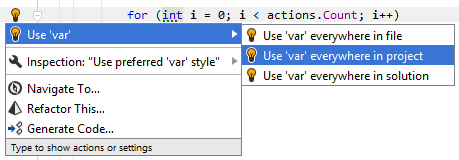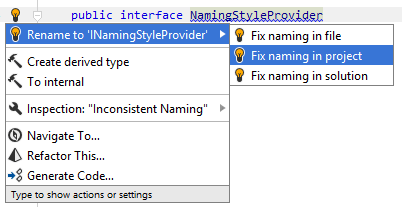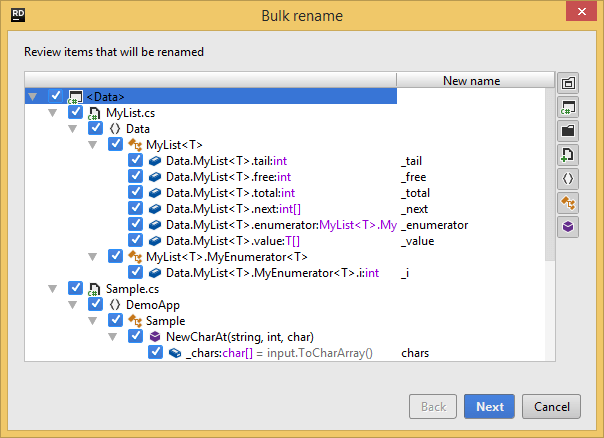Fix in Scope
Most of quick-fixes can fix the current issue under the caret, but some of them (for example Remove unused directives, Make field read-only, Remove redundant cast, and so on) can also automatically find and fix issues in a larger scope — in the current file, in the current project or in the whole solution.
Apply fix in scope
You can recognize such fix by a small arrow displayed next to it in the action list.

Apply fix in scope
Set the caret to a code issue highlighted by a JetBrains Rider's inspection.
Press Alt+Enter or click the action indicator to the left of the caret to open the action list.
Choose a quick-fix that you want to apply.
Click the arrow to right of the quick-fix or press the right arrow key to expand the list of available scopes. If there is no arrow to the right of a quick-fix, then this quick-fix only applies locally.
Select the scope for the quick-fix to apply and click it or press Enter.
If necessary, you can undo all that was changed in these files with a single command: choose in the main menu or press Ctrl+Z.
Fix inconsistent naming in scope
The quick-fix that fixes inconsistent naming, calls the Rename refactoring to make sure that all occurrences of the symbol are renamed in your solution.

Therefore, when you choose to fix naming in a wider scope, JetBrains Rider displays an additional dialog where you can select items to rename:

List of quick-fixes that can be applied in wider scope
The full list of quick-fixes that can be applied in wider scopes includes:
ASP.NET
Optimize register directives
Remove redundant 'imports' in file
Remove unused directives in file (see Code Syntax Style: Namespace Imports)
C++
Add 'template' keyword
Add 'typename' keyword
Apply clang-tidy fix for []
Arrange braces
Arrange cv-qualifiers
Arrange overriding function specifiers
Bulk make local var const
Bulk make local variable declaration const
Change smart pointer to make function
Convert to nested namespace definition
Convert to nested namespaces
Convert to regular return type
Convert to trailing return type
Delete redundant specifier
Delete redundant typename template keywords keyword
Join declaration and assignment
Make member function 'const'
Make member function 'static'
Remove all unused #include directives in file
Remove cast
Remove redundant 'else' keyword
Remove redundant member initializers
Remove redundant parentheses
Remove redundant qualifier
Remove redundant template arguments
Remove statement
Remove unreachable code
Remove unused lambda capture
Replace expression with 'false'
Replace expression with 'nullptr'
Replace 'if' with 'if constexpr'
Replace import directive
Replace throw with rethrow
Replace with a type alias
Replace with a typedef
Replace with prefix operator
Sort #include directives
Sort member initializers by the order of initialization
Use 'auto'
Use static_cast
C#
Argument style Add missing/Remove redundant argument name (see Code Syntax Style: Named/Positional Arguments)
Arrange attributes Place attributes into single section (see Code Syntax Style: Multiple Attributes)
Arrange braces Add missing braces/Remove redundant braces (see Code Syntax Style: Braces for Single Nested Statements)
Arrange code body
Arrange default value
Arrange inconsistent qualifier (see Code Syntax Style: Optional Member Qualifiers)
Arrange object creation
Arrange redundant qualifier (see Code Syntax Style: Optional Member Qualifiers)
Arrange trailing comma
Clarify precedence with parentheses (see Code Syntax Style: Optional Parentheses)
Convert to auto-property (see Use Auto-Properties)
Convert to switch expression
Convert to 'switch' expression
Convert to 'switch' statement
Convert to 'using' declaration
Enforce deconstructing declaration style
Enforce discard declaration style
Fix built in type reference style use type keyword/CLR type name (see Code Syntax Style: Built-In Type References)
Import extension get enumerator method
Import extension get enumerator method popup
Import method (see Code Syntax Style: Namespace Imports)
Import method popup Import item and all other references (see Code Syntax Style: Namespace Imports)
Import type (see Import Missing Namespaces)
Import type quick popup (see Import Missing Namespaces)
Inline 'out' variable declaration
Inline temporary variable
Join null check with assignment
Make auto-property get-only (see Make Auto-Properties Get-Only)
Make operator 'public static'
Make readonly Make fields readonly (see Make Fields Readonly)
Mark nullable (see Value and Nullability Analysis)
Merge 'and' pattern
Merge conditional expression
Merge into pattern
Move to '' namespace
Remove '()' (see Code Syntax Style: Optional Parentheses)
Remove 'abstract' keyword
Remove argument name specification (see Code Syntax Style: Named/Positional Arguments)
Remove 'as' operator
Remove attribute
Remove cast
Remove 'Cast<T>' call
Remove discard
Remove explicit property
Remove guard clause
Remove initializer
Remove invalid statement
Remove modifier
Remove 'new' modifier
Remove param type specification
Remove 'params' array creation
Remove 'partial' keyword
Remove prohibited modifier(s)
Remove property assignment
Remove redundant '?'
Remove redundant argument(s) value
Remove redundant 'ascending'
Remove redundant base constructor invocation
Remove redundant 'base()'
Remove redundant body
Remove redundant braces
Remove redundant 'catch'
Remove redundant comparison
Remove redundant condition
Remove redundant constructor
Remove redundant delegate constructor call
Remove redundant else
Remove redundant 'finally' block
Remove redundant fixed pointer declaration
Remove redundant 'int'
Remove redundant 'internal' modifier (see Code Syntax Style: Modifiers)
Remove redundant 'is'
Remove redundant member initializer
Remove redundant name
Remove redundant 'new'
Remove redundant parentheses (see Code Syntax Style: Optional Parentheses)
Remove redundant parenthesis (see Code Syntax Style: Optional Parentheses)
Remove redundant range bound
Remove redundant section
Remove redundant signature
Remove redundant 'string.Format()' call (see Code Analysis and Helpers for String Literals)
Remove redundant 'ToCharArray()'
Remove redundant 'ToString' (see Code Analysis and Helpers for String Literals)
Remove redundant tuple component name
Remove redundant type arguments
Remove redundant type specification
Remove redundant verbatim prefix
Remove 'sealed' keyword
Remove semicolon
Remove statement
Remove subpattern
Remove 'unchecked' expression
Remove unnecessary whitespace
Remove 'unsafe' modifier
Remove unused directives in file
Remove unused label
Remove unused var
Rename to ''
Replace casts with pattern variable
Replace 'unsafe' statement with its body
Replace with count access
Rethrow exception
Separate statements with blank line
Simplify negated pattern
Simplify negated relational pattern
Sort modifiers (see Code Syntax Style: Modifiers)
To compound assignment
To computed property
To extension method invocation
To null-coalescing compound assignment
To object pattern
To regular string
To string literal
Unwrap from delegate creation
Use array initializer
Use async overload
Use 'await using'
Use base class qualifier
Use conditional access
Use explicit type - Use 'var' or explicit type depending on the code style settings.
Use index from end expression
Use 'nameof' expression
Use negated pattern
Use null propagation
Use nullable short form
Use pattern matching
Use positional deconstruction pattern
Use range indexer
Use span type for stack alloc
Use string interpolation
Use 'var' pattern
Wrap with constructor
HTML
Add/change quotes
JavaScript
Add explicit 'null'
Add missing comma
Add/change quotes
Convert to template string
Fix property name
Json schema incompatibilities
Make all variables from this list block-scope
Move variable '' to inner block
Remove unexpected comma
Rename to ''
Terminate all unterminated statements in file
TypeScript
Change public modifier to conform style
Change to ECMAScript 6 'export default'
Convert cast to 'as' operator
Convert to ECMAScript 6 import statement
Fix relative path style
Js2 ts transformation
Remove redundant qualifier
Remove redundant reference comment
Remove redundant type specification
Remove unused 'import'
Specify '' explicitly
Specify variable type explicitly
VB.NET
Import type (see Import Missing Namespaces)
Import type quick popup (see Import Missing Namespaces)
Make auto-property get-only (see Make Auto-Properties Get-Only)
Make readonly Make fields readonly (see Make Fields Readonly)
Move to '' namespace
Remove 'ByVal' modifier
Remove redundant element
Remove redundant 'imports' in file
Remove redundant qualifier
Remove unused label
Remove unused var
Rename to ''
To implicitly typed
Use string interpolation
V b make readonly Make field read-only (see Make Fields Readonly)
XAML
Remove element
Rename to ''